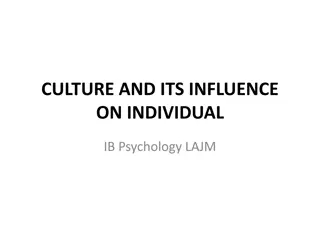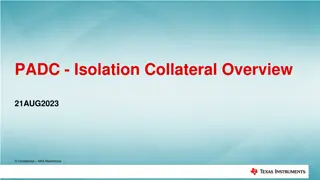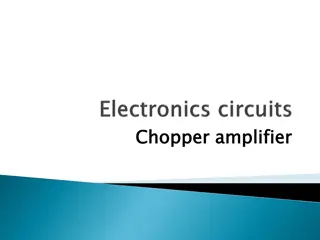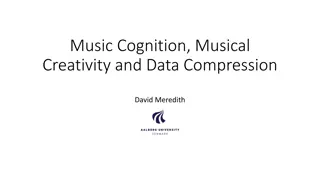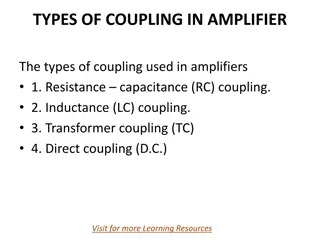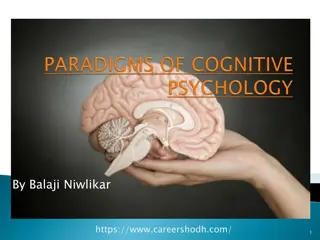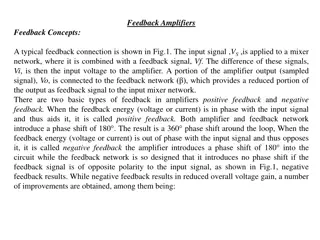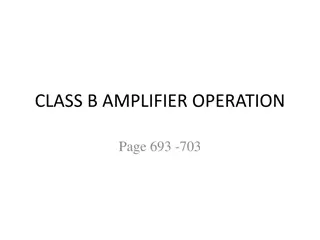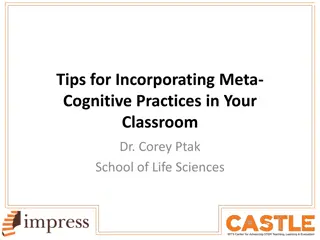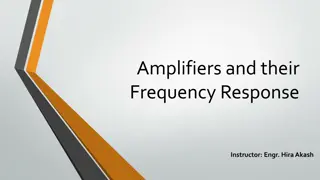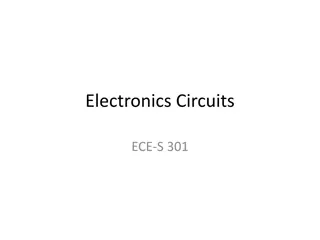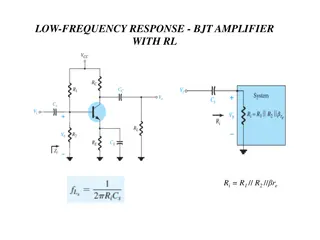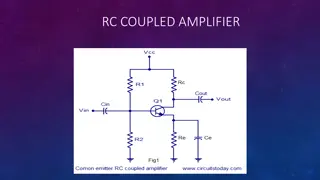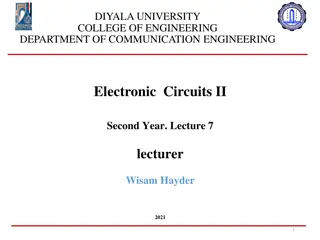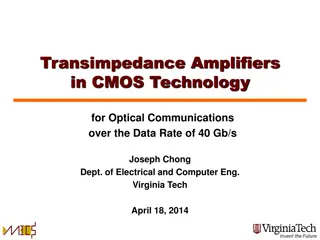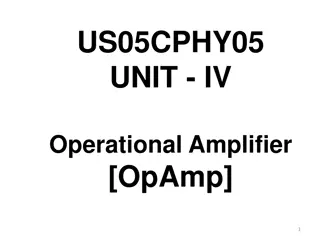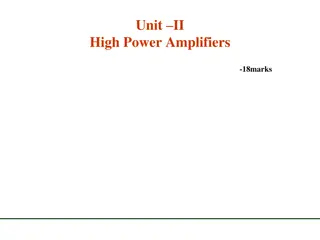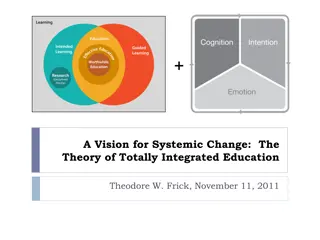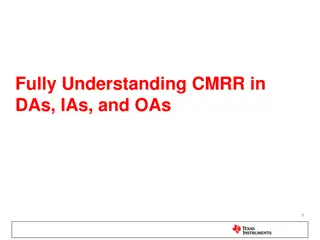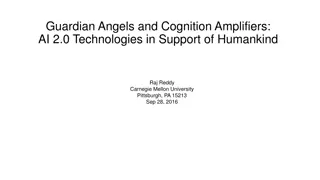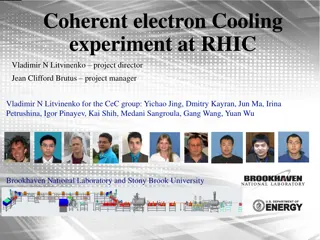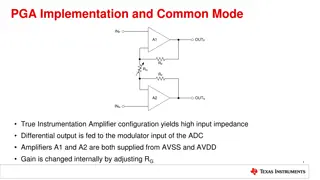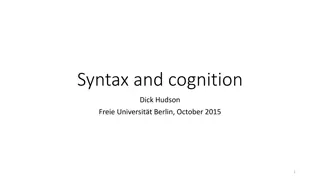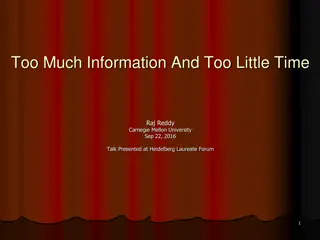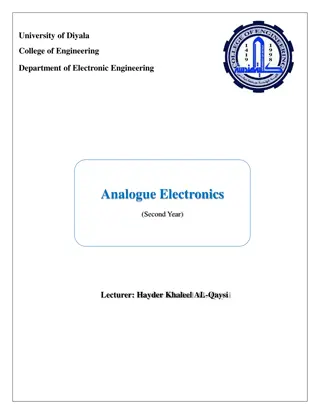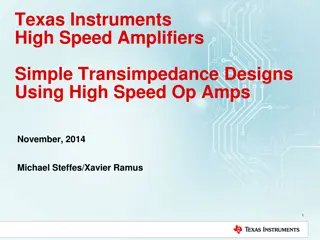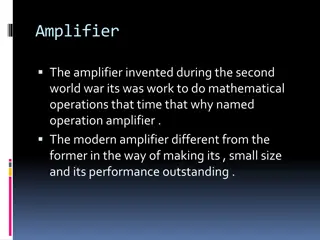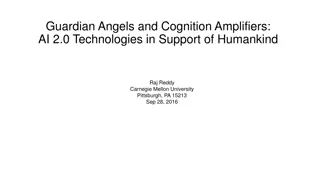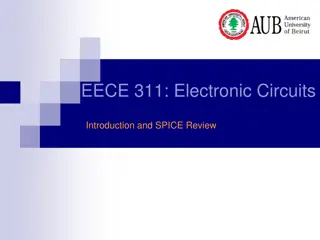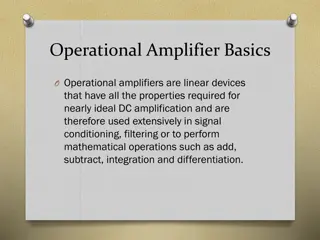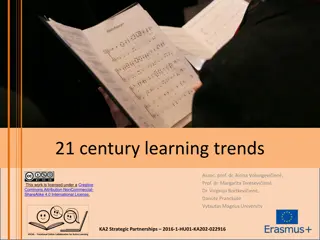Understanding the Impact of Culture on Behavior and Cognition in IB Psychology
Explore the diverse facets of culture's influence on individual behavior and cognition in IB Psychology through topics like cultural origins, norms, and Hofstede's dimensions. Dive into mind mapping, textbook comparisons, and research studies to grasp the profound effects of culture on human psychol
2 views • 41 slides
Isolated Amplifiers and Modulators: Comprehensive Overview
This content provides a detailed overview of isolated amplifiers and modulators, highlighting their design considerations, comparing their features, discussing EMI performance best practices, and offering Excel calculators for voltage and current sensing accuracy. It covers important aspects such as
0 views • 16 slides
Understanding Chopper Amplifiers: Applications and Benefits
A chopper amplifier is an electronic circuit methodology used to minimize signals, DC offsets, noise, and low-frequency circuit conditions in operational amplifiers. Chopper stabilized amplifiers employ modulation to reduce noise, while chopper amplifiers find applications in battery chargers, elect
0 views • 7 slides
The Relationship Between Music, Cognition, and Data Compression
Music composition involves creating novel music for specific audiences. When we listen to music, our brain processes sound data through compression, seeking patterns and relationships to understand and appreciate the music better. This cognitive process is crucial for perception, cognition, and crea
0 views • 12 slides
Amplifier Coupling Techniques and Applications
Amplifiers utilize various coupling techniques such as resistance-capacitance (RC), inductance (LC), transformer, and direct coupling to connect different stages. Each coupling method has its advantages and applications, such as impedance matching, power transfer, and amplification of radio frequenc
2 views • 16 slides
Understanding Integrated Circuit Amplifiers and Design Philosophy
Integrated Circuit (IC) amplifiers are essential components in modern electronics, consisting of miniaturized active and passive devices on a semiconductor substrate. This article explores the building blocks, design philosophy, terminology, device variety, and biasing of ICs, emphasizing the use of
0 views • 11 slides
Exploring Paradigms of Cognitive Psychology
Cognitive psychology, a branch of psychology, delves into mental processes like thinking, perceiving, remembering, and learning. This field views individuals as information processors, with paradigms guiding research methodologies. Key approaches include Information Processing, Connectionist, Evolut
0 views • 18 slides
Understanding Feedback Amplifiers in Electronic Circuits
Feedback amplifiers play a crucial role in electronic circuits by providing mechanisms for controlling gain, stability, and overall performance. There are two basic types of feedback - positive and negative, each offering distinct advantages. The four ways of connecting feedback signals involve volt
1 views • 18 slides
Efficient Class B Amplifier Operation and Power Calculation
Class B amplifiers offer greater efficiency compared to single transistor Class A operation. This article covers the push-pull operation of Class B transistors, input DC power calculations, connecting push-pull amplifiers to loads, output AC power measurement, efficiency calculation, and power dissi
0 views • 28 slides
Enhancing Learning Through Metacognitive Practices
Explore the significance of metacognition in education, including understanding metacognitive processes, knowledge of cognition, regulation of cognition, benefits for students, importance of self-reflection, and exercises that promote metacognition such as retrospectives and exam wrappers. Discover
0 views • 13 slides
Understanding Cascade Amplifiers and Their Applications
Cascade amplifiers are two-port networks designed with amplifiers connected in series, providing enhanced signal strength in various applications such as TV receivers and tuned RF amplifiers. These amplifiers use multiple stages to amplify the overall voltage gain, overcoming limitations of single-s
0 views • 15 slides
Understanding Multistage Amplifiers in Electronics Circuits
Explore the concept of multistage amplifiers in electronics circuits, where several amplifiers are arranged in a cascaded manner to increase gain and reduce distortion. Learn about the benefits, applications, and differences between cascade and cascode amplifiers in this informative guide.
0 views • 22 slides
Analysis of Low-Frequency Response in BJT and FET Amplifiers
This analysis delves into the low-frequency response of BJT and FET amplifiers, examining the impact of various components such as resistors and capacitors on the cutoff frequencies. Detailed examples illustrate the calculation process for determining these frequencies based on specific parameters.
0 views • 18 slides
Understanding RC Coupled Amplifiers and Transistor Basics
Amplification is the process of increasing signal strength without changing its characteristics. An RC coupled amplifier is a multistage amplifier using resistors and capacitors. Transistor amplifiers amplify signals based on transistors with different configurations. The common emitter configuratio
0 views • 23 slides
Transistor Tuned Amplifiers: Operation and Analysis
Transistor tuned amplifiers consist of a parallel tuned circuit as the collector load, amplifying a specific frequency while rejecting others. The resonant frequency of the tuned circuit is crucial for amplification. A high Q circuit offers maximum voltage gain at the resonant frequency but decrease
0 views • 30 slides
Transimpedance Amplifiers in CMOS Technology for Optical Communications at 40 Gb/s
This research by Joseph Chong at Virginia Tech delves into the use of transimpedance amplifiers (TIAs) in CMOS technology for optical communications operating at a data rate of 40 Gb/s. The study outlines the motivation behind the project, the role of TIAs in optical receivers, TIA circuit topologie
0 views • 52 slides
Understanding Operational Amplifiers (Op-Amps) and Their Applications
Operational Amplifiers (Op-Amps) are devices used to amplify signals using an external power source. They are composed of transistors, resistors, and capacitors. Op-Amps find applications in summing amplifiers, AC and DC signal processing, digital-to-analog converters, active filters, oscillators, r
1 views • 41 slides
Understanding Cognition and Decision Making
Cognition encompasses mental activities like thinking, knowing, and remembering, while concepts simplify thinking by grouping similar objects. Cognitive strategies and obstacles in problem-solving, such as algorithms and confirmation bias, also play a crucial role. The "Aha!" moment reflects sudden
0 views • 15 slides
Exploring the Embodied Nature of Human Cognition
Exploring the concept of embodied cognition, this content delves into how human perception and understanding are shaped by physical experiences and interactions with the world. From spatial scenes to the containment concept, it highlights the fundamental role of the body in shaping our cognitive pro
0 views • 37 slides
Understanding High Power Amplifiers with BJT for Efficient Performance
Explore the world of high-power amplifiers utilizing BJT technology, focusing on factors like linearity, efficiency, and maximum power capability. Learn about different amplifier classes - A, B, AB, and C - each with unique operating characteristics. Discover the significance of amplifier efficiency
0 views • 22 slides
Enhancing Education Through Totally Integrated Approach
Theodore W. Frick's Theory of Totally Integrated Education (TIE) emphasizes aligning student cognition, intention, and emotion with authentic learning tasks to create worthwhile education. TIE focuses on systemic change in education and provides a vision for improving learning outcomes by connecting
0 views • 55 slides
Understanding CMRR in Differential Amplifiers
Differential input amplifiers, including operational, instrumentation, and difference amplifiers, play a crucial role in amplifying differential signals while rejecting common-mode noise. The Common-Mode Rejection Ratio (CMRR) is a key parameter in these amplifiers, indicating their ability to suppr
0 views • 48 slides
Guardian Angels and Cognition Amplifiers: Enhancing Human Intelligence with AI 2.0 Technologies
Harnessing the power of AI 2.0 technologies, Guardian Angels and Cognition Amplifiers (Gats and Cogs) augment human intelligence by continuously monitoring user activity patterns and intentions through smartphone sensors. These tools enable automation of daily activities, personalized assistance, an
0 views • 27 slides
Understanding Amplifiers in Electrical and Electronic Principles
In the study of Electrical, Electronic, and Digital Principles, amplifiers play a crucial role in signal processing and transmission. This lecture delves into the classification of amplifiers based on frequency capabilities, coupling methods, and usage scenarios. By exploring different classes of am
0 views • 20 slides
Neuromorphic Computing: Bridging the Gap Between Silicon and Human Cognition
This research delves into neuromorphic computing, a cutting-edge field that merges principles from biology and silicon technology to advance cognitive processing. The study explores top-down approaches, drawing inspiration from the auditory cortex for DNS, and bottom-up strategies to enhance CPU arc
0 views • 17 slides
Coherent Electron Cooling Experiment at RHIC - Project Overview and Experimental Possibilities
Coherent electron cooling experiment at RHIC is led by Vladimir N. Litvinenko with Jean Clifford Brutus as the project manager. The CeC group, consisting of researchers from Brookhaven National Laboratory and Stony Brook University, aims to test various experimental scenarios, including high gain FE
0 views • 18 slides
Understanding Organic Brain Syndrome & Delirium
Overview of organic brain syndrome and delirium, including definitions, clinical features, and management. Delirium, a common psychiatric syndrome, affects consciousness, cognition, and perception, leading to increased morbidity and mortality. Recognize core symptoms, such as disturbances in conscio
0 views • 37 slides
Understanding PGA Implementation and Common Mode Voltage in Instrumentation Amplifiers
The PGA implementation in instrumentation amplifiers allows for high input impedance and precise gain adjustment through internal settings. Common mode voltage plays a crucial role in ensuring proper amplifier operation, with limitations and potential violations impacting signal integrity. Examples
0 views • 5 slides
Master in Language and Mind: Interdisciplinary MA Program at University of Siena
The Master in Language and Mind is an interdisciplinary program focusing on language as a human cognitive capacity, offering two curricula in Linguistics and Cognition and Philosophy and Cognition, with opportunities for double degree programs and collaborations with international universities.
0 views • 21 slides
Dog Cognition: Understanding the Advanced Cognitive Abilities of Dogs
Exploring the fascinating realm of dog cognition reveals how dogs exhibit advanced cognitive abilities beyond that of many non-human primates. From social learning to strong discrimination learning, contingency reversal, and object manipulation, dogs showcase remarkable intelligence that continues t
0 views • 35 slides
Evolution of Syntactic Theory: From Psychology to Cognition
Syntactic theory has evolved significantly, influenced by psychology and cognition. The debate between phrase structure and dependency structure continues, with a shift towards integrating cognitive principles. Cognitive linguistics, including Cognitive Grammar and Construction Grammar, play a key r
0 views • 31 slides
Coping with Information Overload and Time Constraints: Strategies for Survival
The information-rich society poses challenges of handling excessive data within limited time. Concepts like Bill of Rights for information access and understanding human limitations and strengths provide insights into mitigating errors, leveraging knowledge effectively, and addressing common cogniti
0 views • 16 slides
Analogue Electronics Course Overview at University of Diyala - Hayder Khaleel AL-Qaysi
Explore the comprehensive syllabus of the Analogue Electronics course offered in the Department of Electronic Engineering at University of Diyala. Lectured by Hayder Khaleel AL-Qaysi, topics covered include Introduction to Electronics, Diodes, Bipolar Junction Transistors (BJTs), Power Amplifiers, a
0 views • 8 slides
High-Speed Amplifiers: Design Techniques and Considerations
This detailed document explores the design aspects of high-speed amplifiers, focusing on transimpedance designs using high-speed op-amps. It covers basic and advanced design issues, frequency response analysis, and key considerations for achieving desired performance. The content emphasizes simplifi
0 views • 44 slides
Evolution of Amplifiers: From WWII to Modern Integrated Circuits
Amplifiers have come a long way since their invention during WWII for mathematical operations. The modern amplifier is compact, high-performing, and integrated with transistors, resistors, and capacitors on a single chip. The properties of operation amplifiers, input modes, and differential inputs a
0 views • 10 slides
Guardian Angels and Cognition Amplifiers: Transforming Human Intelligence with AI 2.0 Technologies
This explores the integration of AI technologies to enhance human cognition through the creation of personalized Guardian Angels (Gats) and Cognition Amplifiers (Cogs). These tools leverage multimodal sensors on smartphones to monitor activities, infer intentions, and automate daily tasks. The syste
0 views • 27 slides
Electronic Circuits Introduction and SPICE Review Course Information
This course, EECE 311, provides an in-depth exploration of electronic circuits, covering topics such as BJT and MOSFET amplifiers, feedback systems, operational amplifiers, oscillators, and digital CMOS circuits. Students will gain knowledge on amplifier characteristics, frequency response, and the
0 views • 8 slides
Understanding Operational Amplifiers: Basics and Feedback Mechanisms
Operational amplifiers are versatile linear devices used for amplification, signal processing, and mathematical operations. They consist of high-impedance inputs and an output port, enabling various functions such as addition, subtraction, and differentiation. Incorporating feedback mechanisms like
0 views • 6 slides
Emerging Trends in 21st Century Learning Pedagogies
Higher education faces the challenge of adapting to a changing world at the turn of the 21st century. Innovative learning pedagogies such as distributed cognition, personalization, openness, student-generated content, and interactive learning are key in preparing institutions for future competitiven
0 views • 21 slides
RF Power Amplifiers in International Partnership - Development and Contribution Overview
The collaboration between various international partners such as India/DAE, Italy/INFN, UK/STFC, France/CEA/Irfu, CNRS/IN2P3, under the leadership of James Steimel, involves the in-kind contribution of RF power amplifiers for accelerator applications. Partners like DAE/BARC and DAE/RRCAT exhibit sig
0 views • 19 slides
